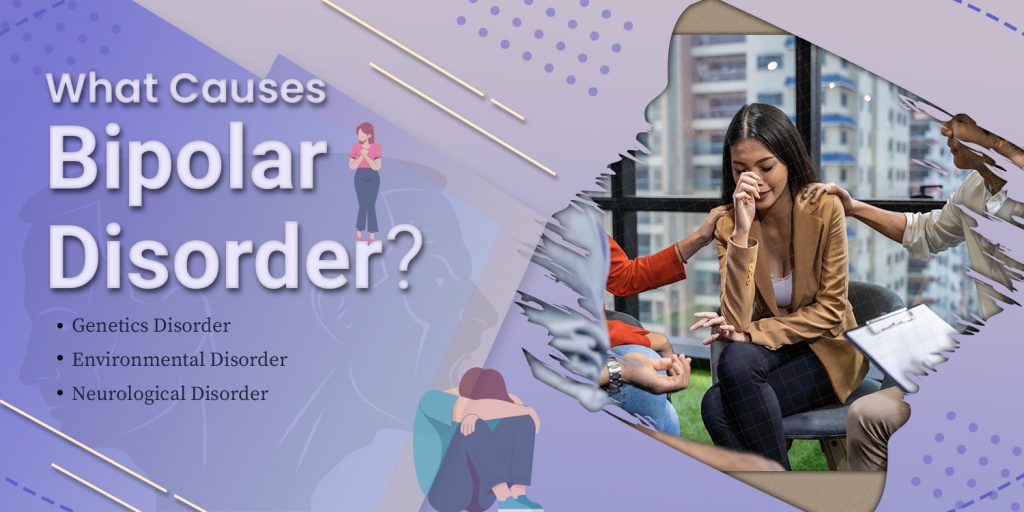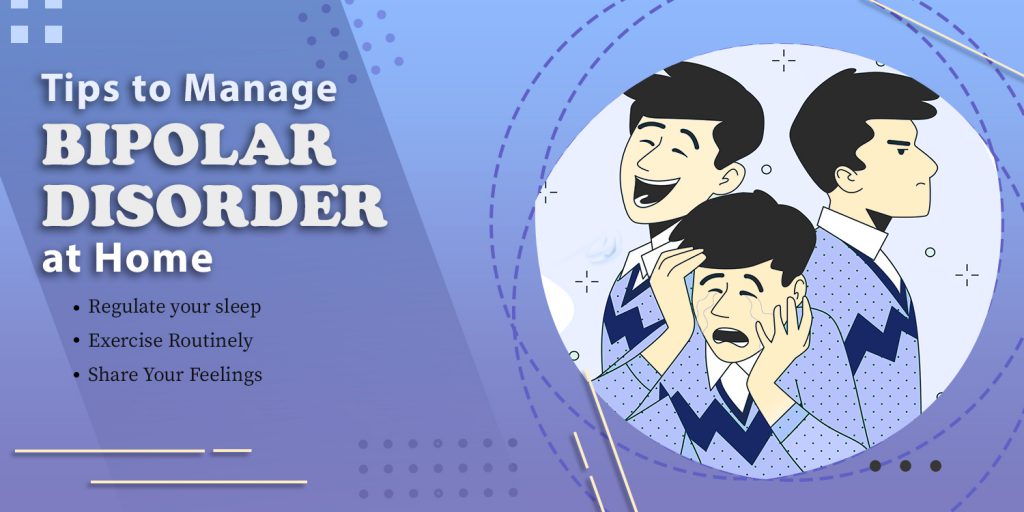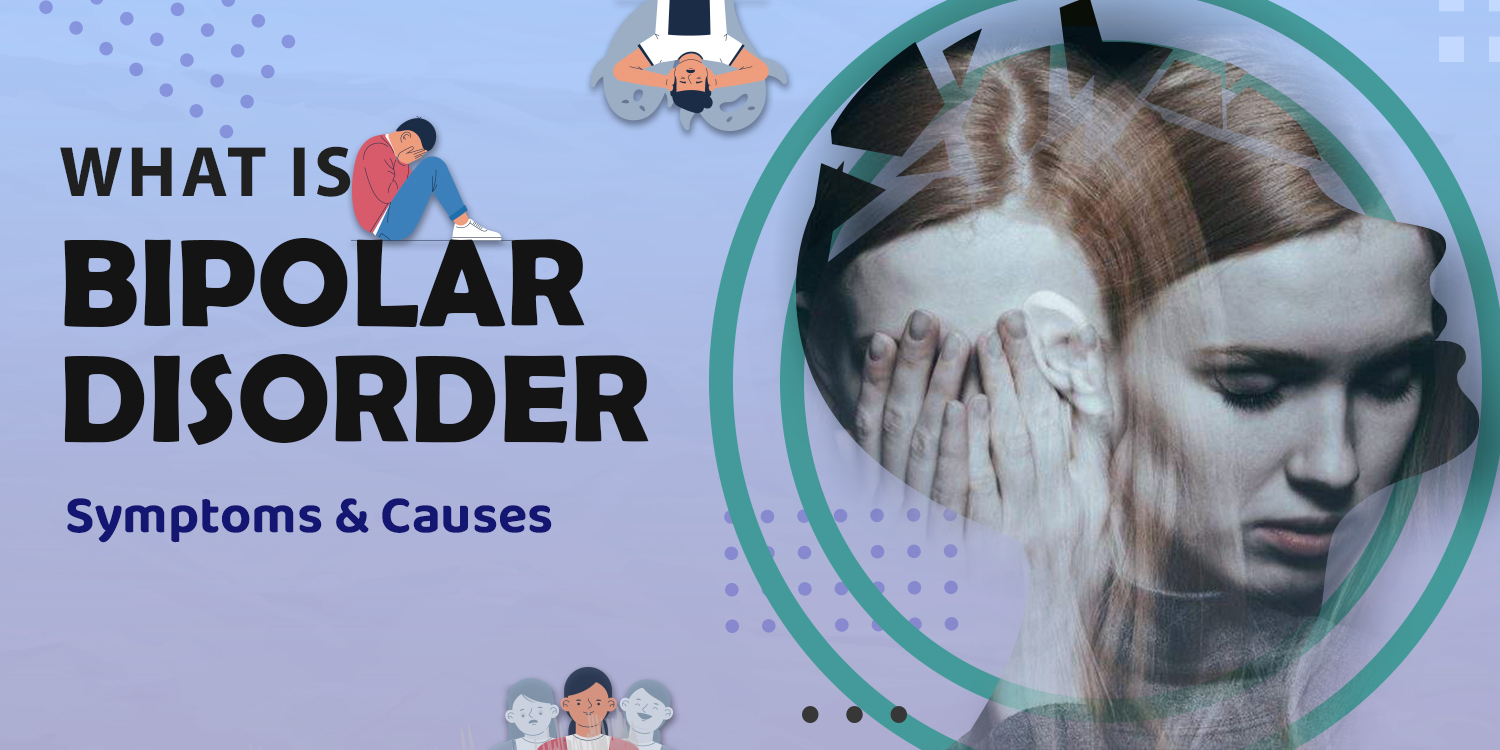What is Bipolar Disorder – Symptoms, Causes
Despite living in the information age, we still prefer to discuss mental health in whispers. This fear has prevented people with mental health issues, such as bipolar disorder, from seeking care and treatment in the same way that other people do. Nearly 7 out of 10 cases of bipolar disorder go undiagnosed or untreated.
In this blog, we share all the information about bipolar disorder– a mental health issue affecting about 2.4% of people worldwide.
What is Bipolar Disorder?
Bipolar disorder, a.k.a. Manic depressive illness, is a mental illness or a brain disorder that leads to unusual and unprecedented shifts in mood, energy level, and task-performing ability. It has two major\popular subcategories, namely;
- Bipolar 1 disorder is characterized by periods of extreme mood swings ranging from ecstatic mania to severe depression.
- Bipolar 2 disorder is milder and is characterized by hypomania episodes that alternate with periods of severe depression.
Symptoms of Bipolar Disorder
An individual with bipolar symptoms will experience extreme mood swings. These symptoms range from extreme highs (mania) to extreme lows (depression). Mania and depression episodes can last for several weeks or months.
During a depressive episode, an individual will be:
- Anxious, restless, or agitated
- Hopeless, helpless, and full of guilt
- Withdrawn from family activities, functions, etc.
- Slowed down, stressed, and low in energy
- Having poor concentration and attention deficit
- Underslept or overslept
- Eating too much or not eating at all
Symptoms of Mania:
During bipolar disorder manic episodes, a person’s mood may be unnaturally elevated or agitated, and they may have a lot of energy. The manic episodes will include:
- Extreme joy and happiness
- Excessive self-esteem
- Reduced sleeping hours(e.g., one feels rested after only 3 hours of sleep)
- Disorganized speech or pressured speech
- Excessive participation in pleasurable activities with a high risk of painful consequences (e.g., engaging in unrestrained buying sprees or foolish business investments)
Symptoms in Children and Teens
Children can also show bipolar depression symptoms. The disorder symptoms are most commonly diagnosed in older children and teenagers, but it can affect children of any age. Bipolar symptoms in children, like adults, can cause mood swings ranging from hyperactivity or euphoria (mania) to severe depression.
During manic episodes, a child may seem:
- Irritated and angry
- Anxious and talkative
- Less focussed and distracted
- Inclined towards risky activities
Children suffering from depressive episodes may:
- Suffer from depression.
- Complain about stomach pain and a headache.
- Eat too much or too little food.
- Discuss and reflect on death and suicide.
If timely care is not provided, the children might :
- Engage in drinking or drug use.
- Be hyperactive at times.
- Do things that can have extreme consequences.
What Causes Bipolar Disorder?
Experts believe that several factors combine to make a person more likely to develop it. These elements are as follows:

Genetics:
If one parent has bipolar disorder, their child has a 10% chance of having it. For someone who has a first relative with bipolar disorder, there is a high risk of developing the disorder, indicating a significant hereditary component.
Environmental:
Environmental factors can also contribute to bipolar disorder. People who have been through traumatic events are more likely to develop bipolar disorder. Childhood factors such as sexual or physical abuse, neglect, parent death, or other traumatic events can increase the risk of developing bipolar disorder later in life.
Neurological:
Chemical imbalances in the brain are thought to be the cause of the bipolar disorder. Depression has been related to issues or imbalances in the brain’s neurotransmitters, including noradrenaline, serotonin, and dopamine, which control the brain’s functioning. A person may develop symptoms of bipolar disorder if the levels of one or more neurotransmitters are out of balance.
Bipolar Disorder Risk Factors
The following factors may raise an individual’s risk of getting bipolar disorder or act as a trigger for your first episode:
- Having a first-degree family, such as a parent or brother with bipolar disorder.
- High-stress situations
- Traumatic event.
- Alcohol or drug abuse
Bipolar Disorder and Suicide
Bipolar disorder can have a negative influence on individuals and families. Everyday life and routine are disrupted. An honest effort must be made on the side of the person with bipolar disease to deal with chronic emotional distress and periodic tendencies toward strange or harmful behavior. Treatment, medications, and therapies can be costly too. Hence, there is additional financial stress as well.
With all of the above factors combined, there is a high probability of suicidal thoughts among individuals who develop the disorder.
Suicide is a significant risk for people who have bipolar disorder. Suicide is attempted by between 25% and 50% of people with bipolar disorder, and 15% die by suicide.
How is Bipolar Disorder Diagnosed?
To diagnose bipolar disorder, a doctor may perform a physical examination, an interview, and order specific bipolar disorder tests. While blood tests and body scans cannot diagnose bipolar disorder, they can help rule out other illnesses that may look like it, such as hyperthyroidism.
Bipolar Disorder is Frequently Misdiagnosed
Nearly 20% of cases of bipolar disorder are either misdiagnosed or overdiagnosed. Being correctly diagnosed is crucial to receiving the appropriate treatment for your bipolar disorder, allowing you to control your symptoms and live a healthy, active life.
It would be best if you didn’t hesitate to talk to your doctor about all of your symptoms and emotions, both good and unpleasant. It will help you receive an accurate diagnosis and prevent health concerns caused by wrong prescription medicines.
If you have any reservations or questions after receiving your diagnosis, you can always ask your doctor about their reasoning. A good doctor should be willing to talk about the reasons and explain themselves if they’re unsure.
Bipolar Disorder Treatment
Episodes of bipolar-related mania can last between 3 and 6 months if a person is not treated. Episodes of depression typically last 6 to 12 months. However, with effective treatment, episodes usually resolve within three months.
Most people with bipolar disorder can be treated with a combination of medications. The bipolar disorder treatment plan that the doctor recommends will include one or more of the following:
- Mood stabilizers to prevent episodes of mania and depression.
- Therapies to identify as well as resolve triggers for depression or mania episodes.
- Lifestyle changes– such as regular exercise, and planning fun and enjoyable to give a sense of accomplishment
- Dietary changes to improve sleep and reduce stress.
Tips to Manage Bipolar Disorder at Home
Medications are a must for bipolar disorder treatment. However, other factors such as your lifestyle and habits play an important role in the treatment of bipolar disease. Here are a few things to keep in mind:

1. Regulate your sleep:
Try to go to bed and wake up at the same time every day; set a schedule for yourself. On a weekend, you might stay up a little longer, say, until midnight instead of 10:00 p.m., but not until 4:00 a.m.
2. Exercise:
No, you don’t have to be a gym rat or spend hours on the treadmill, but you do need to move your body regularly in a way that you love. (For example, go for a brisk walk or ride your bike for a few kilometers.)
3. Share Your Feelings:
When you’re feeling down or sad, find someone with whom you can communicate your thoughts and feelings. Even if communicating your emotions with family members is tough, consider sharing them with a trusted friend.
The Bottom Line
Living with bipolar disorder is never easy. But the good news is that most people with bipolar disorder can get treatment without going to the hospital. Some persons with bipolar disorder find it simple to discuss their illness with family and friends. Others prefer to seek help from organizations and support groups.
If you or someone you know has frequent mood swings from extreme highs to extreme lows, it’s always a good idea to seek professional help. You can connect with the best mental health experts near you online using the Kayawell platform.
